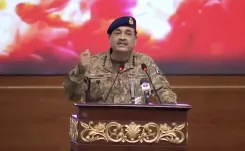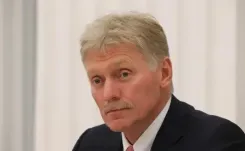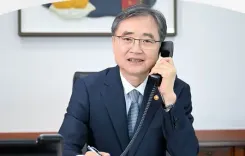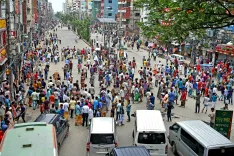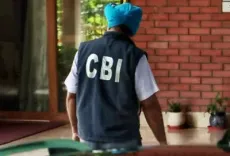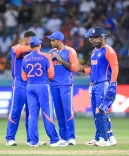Who Might Succeed Justin Trudeau as Canada’s Next Prime Minister?
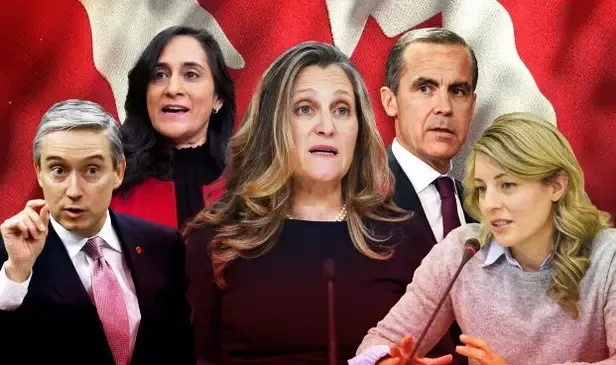
Ottawa, Jan 8 (NationPress) The competition to find a successor for Canadian Prime Minister Justin Trudeau officially commenced on Tuesday, just a day after he stepped down amid an impending trade dispute with the United States and a fractured political atmosphere domestically.
With the current Liberal Party experiencing significant declines in public opinion polls, the winner of the leadership race may face the daunting task of leading the party from the opposition after the votes are tallied.
Support has been extended to Trudeau's opponent, Conservative leader Pierre Poilievre, by Elon Musk, an ally of President-elect Donald Trump.
Trudeau's announcement regarding his upcoming departure necessitates the appointment of a new leader for Canada’s Liberal Party. With the likelihood of a government collapse when Parliament reconvenes in March, the party is eager to establish new leadership swiftly.
The national board of the party is scheduled to convene this week to initiate the leadership selection process, which traditionally spans several months. Current polls suggest that the Liberal Party is on a trajectory toward electoral defeat, which might deter some potential candidates from entering the race. Below is a look at individuals who might consider running.
Historically, the party has predominantly chosen its leaders from Ontario and Quebec, yet three potential candidates -- Chrystia Freeland, Mark Carney, and Christy Clark -- all have connections to western Canada, potentially broadening the party's appeal in a region largely influenced by the Conservatives.
Chrystia Freeland
The former Finance Minister and Deputy Prime Minister is seen as having instigated Trudeau's resignation by announcing her own departure three weeks earlier. Once a trusted ally, she resigned due to disagreements over strategies to counter incoming Trump administration threats of imposing 25 percent tariffs on all Canadian goods and services.
In her resignation letter, she issued a harsh warning to Trudeau against pursuing "costly political gimmicks" and indicated that the nation faced "a grave challenge".
Freeland has built a reputation as a dependable and long-serving member of Trudeau's Cabinet since 2015, managing various portfolios including foreign affairs and international trade. She is recognized for her adept renegotiation of the North American Free Trade Agreement with the initial Trump administration, which ensured Canada’s access to the US market despite challenging political dynamics.
This former journalist is regarded as a leading candidate to take over from Trudeau.
Mark Carney
The ex-governor of both the Bank of England and the Bank of Canada has been frequently mentioned as a potential member of the cabinet. Trudeau confirmed in 2024 that he had encouraged Carney to enter federal politics; indeed, tensions between Freeland and Trudeau reportedly arose amid speculation that he sought to replace her with Carney.
On Monday, Carney, 59, stated he would be "considering this decision closely with my family over the coming days". His economic expertise during a global economic crisis is viewed as advantageous by some, though skepticism exists regarding his candidacy due to his lack of prior political experience.
Traditionally, Carney, now serving as chair of Brookfield Asset Management, would need to secure a parliamentary seat to assume office should he win the party leadership.
François-Philippe Champagne
Champagne has held several significant cabinet roles since 2018, including foreign affairs and currently serving as the minister of innovation.
Often described as an "Energiser bunny", he has been credited with securing multiple lucrative agreements for Canada, including a C$2.8 billion deal with Stellantis to enhance EV production in Canada and a C$7 billion project with Volkswagen to establish its first gigafactory outside of Europe.
His business acumen, coupled with a reputation for charm and optimism, could serve him well in a Liberal leadership role. Additionally, he hails from Quebec, a province often pivotal in federal elections.
Melanie Joly
Just weeks prior to Trudeau's resignation announcement, a US media outlet highlighted the Foreign Minister as a "top contender" for his position. This prompted her to reaffirm her support for the Prime Minister, though she did not explicitly deny any leadership aspirations.
With a law degree from Oxford, she has been in charge of foreign affairs for three years. This role has placed her at the forefront of Canada's disputes with New Delhi over allegations of criminal activities, including homicide, by Indian diplomats in Canada, as well as tensions with Beijing concerning the imprisonment of two Canadians seemingly in retaliation for the arrest of a Chinese executive in Canada.
Some have criticized her handling of these crises, which could undermine her leadership bid; a poll cited by CTV News showed her with only 4 percent support. Nevertheless, she stated to the Times: "It's been the story of my life, you know, being underestimated."
Anita Anand
Elected in 2019, the current Transport Minister quickly assumed a crucial role during the Covid pandemic, responsible for acquiring vaccines and PPE as the procurement minister.
She later became Defence Minister, overseeing Canada's response to the Russian invasion of Ukraine and addressing a review of sexual misconduct allegations within the military.
Her high-profile roles have led to increased speculation regarding her leadership potential. A 2023 cabinet reshuffle that promoted her to president of the Treasury Board fueled rumors of a demotion due to her perceived ambitions.
Dominic LeBlanc
LeBlanc, a long-standing ally of Trudeau, has previously pursued the leadership and reportedly enjoys the backing of at least a dozen Liberal MPs. He is widely viewed as a steady choice, having tackled challenging portfolios, including stepping in to replace Freeland as Finance Minister after her resignation.
He has also been pivotal in Canada's efforts to improve relations with the forthcoming Trump administration, accompanying Trudeau to Trump's Mar-a-Lago resort in November.
Like Trudeau, he is part of political royalty in Canada; his father was the former governor-general, MP, and senator Romeo LeBlanc. Their families' ties go back decades -- LeBlanc babysat for Trudeau when they were younger and served as a pallbearer at the funeral of Trudeau's father, former Prime Minister Pierre Trudeau. LeBlanc opted not to run in the 2012 leadership race when Trudeau made his intentions known.
Christy Clark
Clark, the former premier of British Columbia, has also emerged as a potential candidate due to her previous leadership experience and distance from Trudeau.
A fiscally conservative politician, Clark served as premier from 2011 to 2017 and led the BC Liberal party, which is independent of the federal Liberals.
A staunch critic of Trudeau, Clark expressed on social media shortly after the Prime Minister’s resignation announcement: "As a lifelong Liberal, I look forward to joining tens of thousands of Canadians to choose our next leader."
"This is the biggest opportunity in over a decade that we've had to grow our Party and welcome new Liberals – including Canadians concerned about the future of our country – let’s seize it."
Despite her governance credentials, her proficiency in French is weaker compared to other candidates. Fluency in both of Canada’s official languages is typically a requirement for the role of Prime Minister, and a candidate lacking in this area could face political challenges in Quebec, a province that has historically been a stronghold for the party.

